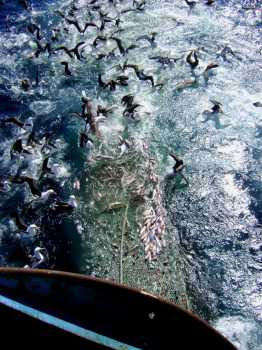Rebecca Lewison (Institute of Ecological Monitoring and Management, San Diego State University, California, USA) and (many) colleagues, writing open-access in the journal Endangered Species Research, review conservation research needs for seabirds. Not surprisingly, fisheries bycatch of albatrosses and petrels gets discussed.
The paper's abstract follows:
"Seabirds are facing a growing number of threats in both terrestrial and marine habitats, and many populations have experienced dramatic changes over past decades. Years of seabird research have improved our understanding of seabird populations and provided a broader understanding of marine ecological processes. In an effort to encourage future research and guide seabird conservation science, seabird researchers from 9 nations identified the 20 highest priority research questions and organized these into 6 general categories: (1) population dynamics, (2) spatial ecology, (3) tropho-dynamics, (4) fisheries interactions, (5) response to global change, and (6) management of anthropogenic impacts (focusing on invasive species, contaminants and protected areas). For each category, we provide an assessment of the current approaches, challenges and future directions. While this is not an exhaustive list of all research needed to address the myriad conservation challenges seabirds face, the results of this effort represent an important synthesis of current expert opinion across sub-disciplines within seabird ecology. As this synthesis highlights, research, in conjunction with direct management, education, and community engagement, can play an important role in facilitating the conservation and management of seabird populations and of the ocean ecosystems on which they and we depend."

Albatrosses and petrels accumulate behind a trawl. Photograph by Neil Anders
Reference:
Lewison, R. et al. 2012. Research priorities for seabirds: improving conservation and management in the 21st century. Endangered Species Research 17: 93-121.
John Cooper, ACAP Information Officer, 22 May 2012

 English
English  Français
Français  Español
Español